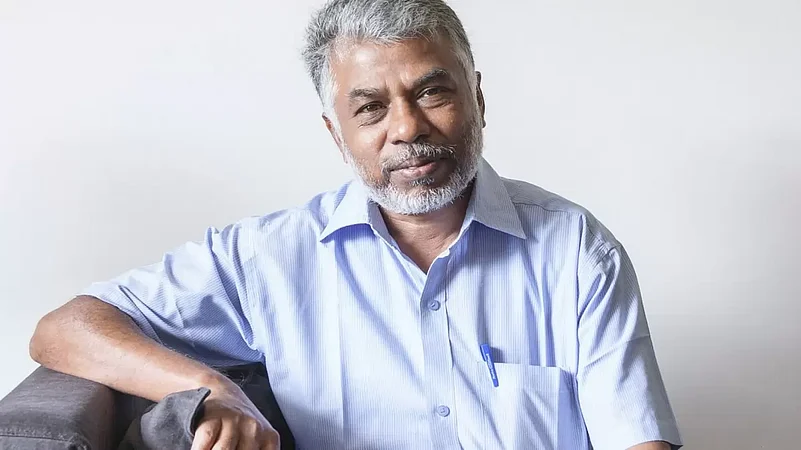It is crucial to amplify the voice of women, says Tamil writer Perumal Murugan, the chronicler of the ordinary whose stories are a reflection of rural Tamil Nadu and carry the essence of the human condition.
Women have always been central to Murugan’s literary universe, be it Saroja of “Pyre”, Ponna of the controversial “One Part Woman”, or even the titular she-goat of “Poonachi”. And they are so in his latest “Fire Bird” as well, each woman protagonist not just an essential part of the rural reality but also giving his plots decisive shape.
“Fire Bird”, translated into English by Janani Kannan, won the JCB Prize for Literature 2023.
“The strength of women's voices is evident in our everyday reality, particularly in our region. Women engaged in agriculture, managing rainfed landscapes, showcase remarkable hard work. Their pivotal role in tasks like agriculture and animal husbandry is indispensable,” Murugan told PTI in an email interview.
“Recognising their significant contributions, I find it crucial to amplify their voices. I am committed to bringing attention to their perspectives effortlessly,” he added.
Murugan’s latest book, “Fire Bird”, originally written in Tamil as “Aalandap Pakshi”, revolves around the lives of Perumayi and Muthu after the latter has been cheated out of his ancestral property by his own family.
It is Perumayi who prods and encourages Muthu to go look for a better land and start a new life away from the shackles of a patriarchal and exploitative family structure.
Murugan said he named the character after his mother as a tribute to her qualities of dedication, integrity, compassion, and leadership.
“These traits, which resonate with my mother's character, hold personal significance for me,” he said.
Before “Fire Bird”, “Poonachi” and “A Lonely Harvest” had been shortlisted for the JCB Prize for Literature. His book “Pyre”, “Pookuzhi” in Tamil, was also longlisted for the International Booker Prize 2023.
Murugan, whose stories are deeply ingrained in the soil of Tamil Nadu, believes the acknowledgement of his works “fosters confidence in the universality of the narratives” he creates.
“I consider these accolades a gift to the Tamil language, prompting contemplation on whether they signify that Tamil, with its literary heritage of over 2,000 years, continues to exert influence in modern literature. The acknowledgment of my works, rooted in a small part of Tamil Nadu, fuels my motivation to craft more elements of this unique life. It also fosters confidence in the universality of the narratives I create,” the 57-year-old said.
A “proficient reader of English”, Murugan is known for sticking to Tamil for writing as well as communicating in person.
“Expressing myself in Tamil is not just a matter of language; it's a way of conveying the entire essence of life in the western part of Tamil Nadu. By considering it as a universal medium, I can vividly depict the life I envision,” the author said.
Having written stories and characters that are honest to the socio-cultural fabric of India, Murugan has also courted controversies over the years.
His novel, "Madhurobhagan" (2010), translated into English as "One Part Woman", revolves around the suffering of a childless couple, Kali and Ponna, facing social stigma and humiliation.
The novel attracted widespread protests in Tamil Nadu that called for cancelling the book’s publication as well as an unconditional apology from Murugan. It eventually led the writer to announce “literary suicide” on Facebook in 2015.
In 2016, the Madras High Court rejected all the criminal complaints against Murugan and ruled in his favour to write.
“I changed my mind when I read the Madras High Court's verdict on July 5, 2016. The last line simply said, ‘Write’. Taking it as a command, I started writing. I believe that if there's ever an issue with the right to write, we can overcome it by using the freedom creative strategies provide,” he said.
Murugan has continued to write since then and believes that the life he depicts in his writing is a “shared knowledge accessible to others”.
“Is there a universal thread of unity in basic emotions, transcending cultural backgrounds? Do pleasure and pain, stemming from emotions like love, lust, separation, and displacement, share commonality across different cultures? This suggests the potential to empathise with another person's emotions in a different context.”
“The life I depict in my writing is a shared knowledge accessible to others. Literature, as an art form, intertwines emotions and knowledge to create a rich and collective experience,” Murugan said.





















